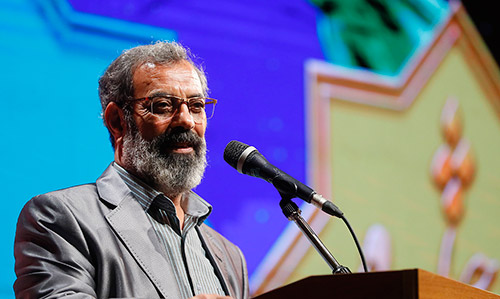Mail Carrier
Compiled by: Sepideh Kholusian
Translated by: Fazel Shirzad
2023-06-20
Note: The 339th Night of Memory titled "Mail Carrier" was held on Thursday, September 29, 2022, with the presence of the Postbank family of the country in Soreh Hall of the Arts Center presented by Dawood Salehi.
■■■
In the second part of the program, the presenter invited Hossein Mahmoudian, a documentary maker, writer and producer, to talk about the content of his letters and memories.
Mr. Mahmoudian said: I have no experience in front of many of the people present in this gathering. The first time I was sent to the front and I was allowed to be on the front was on March 17, 1985. Martyr Morteza Marvotti, who was one of my friends, wrote a letter to me on March 6, 1986, which began as follows:
"Postman, I hope you are tired. Tehran, South Mehrabad, 20 meters away from Shamshiri, Banyan St., Shahid Akbar Vahedi Alley, on the right, fourth door, Hossein Mahmoudian.
Indeed, the heat and fire that Imam Hossein (PBUH) put in the hearts of people cannot be extinguished. This fire is the fire of love and mysticism.
Hello.
Thanks to God who created imams and prophets to guide mankind. Lord, I thank you for watching over me always..."
In this letter, Morteza asked me to go there if I want to understand the situation of the front and described the front to me. He was martyred in 1986 in the additional operation of Dawn 8 in Faw.
After his letter, my pleas to my family also started to go to the front. In our neighborhood, we had a dear family named Shahabadi who had two martyrs. Ali Shahabadi was one of my fellow mosque friends. His mother vowed that if her first son could go to the front, she would send 6000 blessings for the health of Imam Mahdi (PBUH). His first son was martyred. This vow was repeated for the second son as well, and I also vowed these 6000 blessings to the mother of those martyrs and I was able to go to the front for the first time, but on the day of the deployment, my file was lost.

Narrator continued: One of the people who saw me in the corridor of Moqdad base, mistook me for someone and said: Are you here? Haven’t you gone yet I said: No, my file is lost. He said: For what? Then he took my hand and took me to the dispatch officer and asked them to write me a dispatch slip. They asked: For which barracks? He answered: No. He is one of the old people. He wants to go again.
This is how they wrote me a re-deployment form and I was sent without checking my previous records; while I was neither trained nor had previous information. I left on March 17th, and on March 18th, I got off the train in front of Do-kuheh, and it was around March 21st that we were on the defensive line of Mehran on New Year, and Mehran was still in our hands.
After reading parts of his letters during the war, the narrator said about the importance of these letters: The fact is that letters were an important chapter in terms of time and place when they came from or were sent to the front. Sometimes the status of a fighter could be understood from the number of letters. When I was in Martyr Kalantari hospital for a week, my family found out that something had happened to me and said that you didn't write a letter once in a few months, now that you are writing is strange!
Usually, the food they brought was accompanied by a letter and the fighters were waiting. Some people's donations to the fronts, including compotes, had inscriptions such as "Dedicated to my dear fighting comrades at the front." Sometimes there was a fight over written donations. I remember one of the fighters was willing to leave the trench under enemy fire to receive a compote.
The third narrator of the program was Mashallah Shahmoradi, who is also active in the fields of acting, writing, directing and designing costumes. This movie and television actor, who is one of the fighters of the eight years of holy defense, also attended this ceremony and narrated his memories with his sweet expression.
■
At the end of this remembrance night program, the book “Mail Carrier" written by Sasan Natiq from Soura Mehr publication was also introduced. This book is the memoirs of captive Sarafraz Mahmoud Mansouri, which is arranged in 20 chapters and deals with his memories from the time before the holy defense and the period of captivity.
The End
Number of Visits: 2533
http://oral-history.ir/?page=post&id=11292
